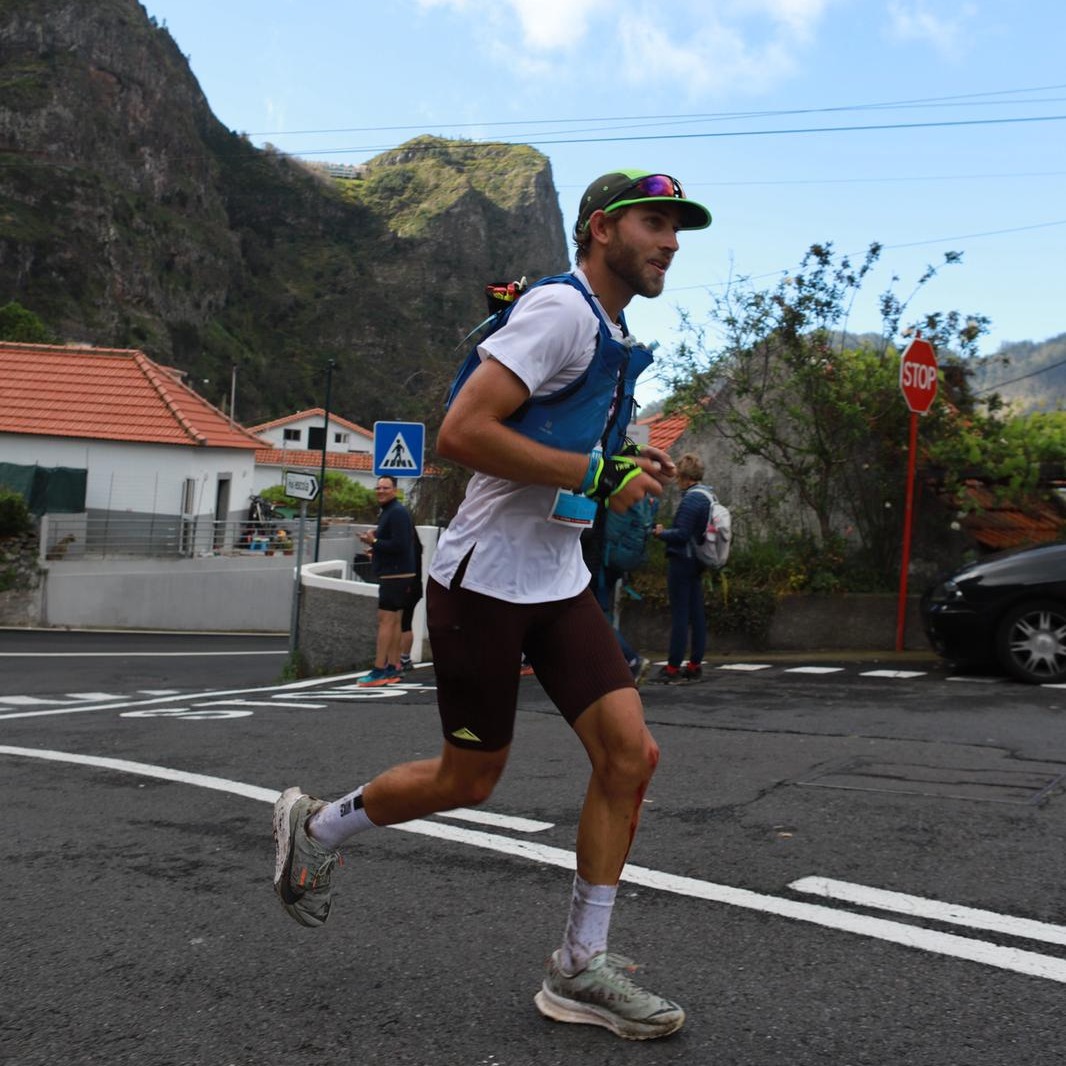
Caleb Olson
Western States® 100-Mile Endurance Run
Caleb's headline numbers
Caleb's strategy
Fueling
Carbohydrate is the main fuel you burn when racing. Failing to fuel properly is a leading cause of underperformance in longer races.
Caleb conquered his first 100-mile race at Western States, and knew beforehand that fueling adequately could be the difference between a successful and unsuccessful debut. He practised his planned race nutrition at his ultra in Madeira earlier in 2024, which paid off with interest at WSER where he never deviated from his planned ~100g per hour, using small Flow Flasks of ice cold Flow Gel. Since PF&H Sports Scientist, Minty, was on the ground helping crew Caleb, he was able to weigh every bottle and gel before the race, and collect them at every crewed aid station (seven total) to track his intake, and be ready to adjust the plan if necessary. Thankfully, Caleb’s extensive gut training meant he never had to change his strategy, and relied entirely on sports nutrition products from gun-to-tape; culminating in the fastest ever Western States debut time, which would have won 46 of the previous 48 editions.
Hydration
Taking on board an appropriate amount of fluid and sodium is essential to maintaining blood volume and supporting the cardiovascular effort needed to perform on race day.
Whilst the absolute amount of sodium and fluid consumed per hour is important, it’s critical to consider these in relation to each other. This is known as 'relative sodium concentration' and it’s expressed in milligrams per litre (mg/L). How much sodium you’re taking in per litre of fluid is more important than the absolute amount taken in per hour.
Sweat sodium concentration (mg/L) is largely genetically determined and remains relatively stable. Knowing how salty your sweat is enables you to replace a good proportion of your sweat losses, which can range from 200-2,000mg/L.
Whilst Caleb’s losses are on the low side, getting his hydration strategy right is still crucial when it’s hot and/or humid as his higher sweat rate in these conditions can result in significant net losses over the duration of a race.
Learn moreEven though Caleb has a relatively low sweat sodium concentration, considering the duration of the event and his relatively high sweat rate, he chose to slightly ‘over-salt’ his drinks using PH 1000. He alternated between Packets and Tablets depending on how he felt at the time and if he needed the extra bit of carb in the Packets. He then diluted this with plenty of plain water at uncrewed aid stations. Caleb also carried several Electrolyte Capsules to take when drinking plain water to stay on top of his sodium intake, but felt he was balancing his electrolytes well, so only took three throughout the race. Temperatures reached a scorching 36℃ (97℉) between miles 65-80 (105-129 km), and Caleb knew his sweat rate would be significantly higher than during the opening miles where conditions were far milder (~7℃, 45℉). Whilst his average fluid intake was ~886ml/h, at times he was drinking <350ml/h, with peaks of >1.1L/h. Without doubt this flexible hydration strategy helped him stave off dehydration, avoid GI discomfort completely and enabled him to pee fairly soon after the race in doping control!
Caffeine
Beyond the Three Levers of Performance (carb, sodium and fluid), caffeine is one of only a few substances that is proven to improve performance for most endurance athletes as it can help stave off mental and physical fatigue.
Caleb has been working on adding caffeine to his strategy since joining the PF&H squad, and this race was the first where he felt he crushed it. Having been sensitive to the stimulant in early trials, Caleb would see heart rate spikes, feel anxious, and sometimes like his efforts were much harder than normal. But through trial-and-error and a ‘drip-feed’ approach, he found himself coming into aid stations asking for Caffeine Gels more often than ever before, reaping the perceptual ergogenic benefits all day long.
How Caleb hit his numbers
Here's everything that Caleb ate and drank on the day...
Caleb's weapons of choice
Final thoughts
Caleb's full stats
Data Confidence?
There is an adequate level of accuracy in the data collected and the numbers reported. The athlete manages to recall what they ate and drank including most specifics (brands flavours quantities plausible estimations of volumes). However there are estimations made within the data which affect the overall confidence level in the data reported.